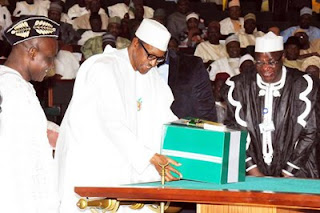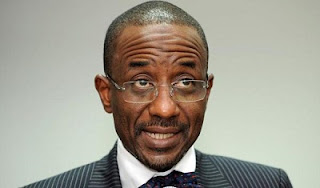President Muhammadu Buhari presented the proposed 2016 budget on December 22, 2016, naming it 'the budget of change', but Nigerians have now re-christened the document 'budget of corruption.'
While some of the public concerns about suspicious and fraudulent allocations are valid, the presidency has said that the president is open to correction, admitting that the budget is not perfect. With N6.08 trillion proposed for the 2016 budgetary year, the budget is seen as an expansionary one aimed at revamping the economy.
From close observations, here are seven reasons why the budget does not deserve to be passed by the legislature.
1. NATIONAL ASSEMBLY’s 'UNCHANGED' ALLOCATION
Nothing betrays the budget of change as much as the N115 billion for the national assembly, with little or no explanation on how the money would be spent.
The national assembly under former president Goodluck Jonathan had a one-line item for the national assembly, which was never explained to the public in budgetary terms. That tradition has crept into the 'change' government and should not be allowed to thrive.
The lawmakers Nigerians trusted with votes to ensure oversight in public financing should not be above the same oversight. The national assembly should show the constituents of its one-line N115 billion.
2. STATE HOUSE CLINIC VS FEDERAL HOSPITALS
University College Hospital (UCH), Lagos University Teaching Hospital, Ahmadu Bello University Teaching Hospital, University of Nigeria Teaching Hospital and Obafemi Awolowo University Teaching Hospital will be spending N1.27 billion on capital projects.
The state house clinic, which services the president, the vice president, lawmakers and a few other Nigerians, would spend N3.2 billion on capital projects – more than double of that of the allocations to the five leading federal hospitals put together. Buhari promised to cater to the wellbeing of the poor, but this budget is destined to achieve the exact opposite.
3. WEBSITE AND SOFTWARE BILLIONS
According to the proposed budget, the federal ministry of solid minerals would spend N795 million on website update. The federal ministry of education would also be expending N258 million on the maintenance of its website and provision of antivirus and portal design and development for Nigeria education management information system (NEMIS).
In just five items, the federal government is proposing to spend N1.16 billion on websites. The state house says it would spend N268 million on computer software acquisition and N55 million for its installation. The state house medical centre would also be spending fresh N29 million on software acquisition.
The National Intelligence Agency and federal ministry of foreign and intergovernmental affairs are also planning to spend N4.10 billion and N1 billion on computer software. Are websites and software really that expensive?
4. UNREALISTIC $38 OIL BENCHMARK
The international oil market has been doing well lately, with the basket price of crude oil from the Organisation of Petroleum Exporting Countries (OPEC) currently at $29 against $25 in January 2016.
As at Tuesday, a barrel of Nigeria’s Bonny Light, according to CBN figures, traded at $32.83per barrel, about $5 less than the proposed benchmark. With Iran complaining that its oil storage reserves are getting full, its supply to the global market may increase and further reduce oil prices, which inevitably increase our record deficit of N2.2 trillion. It is better to put our own fate in our hands, rather than in the uncertain crude oil market.
5. VANDALISM AND OIL PRODUCTION LEVELS
According to OPEC, Nigeria’s oil production stood slightly above 1.8 million barrel per day in 2015. The budget, in this case, also has an overly optimistic stance of producing 2.2 million barrels per day in 2016.
Recent vandalism in the Niger Delta is sending ripples that the 2015 1.8 million barrels’ mark may not even be achieved. Besides vandalism, falling oil prices are pushing the compulsory shutdown of some deep on-shore oil fields, with high cost of production, limiting production to cheap off shore fields.
This would in turn reduce production. With lower prices, lower production levels, the N820 billion in oil revenues, expected to fund part of the budget may just be a mirage.
6. THE RATS FEASTING ON THE BUDGET
On Monday, new revelations hit the Nigerian media space, with Isaac Adewole, minister of health, disowning the budget proposal for his ministry, saying it was 10 percent less than what his team proposed.
Adewole’s presentation of a new budget for the health ministry shows that the initial budget being worked upon by the national assembly had been altered by “rats”. The budget is a 1,800-page document. God knows how much work the rats have done on other ministries.
7. VILLA RENT AND EXCESSIVE SPENDING ON CARS
Until now, Nigerians thought the presidential villa in Abuja and the state house in Marina Lagos was owned by the government, but the budget seems to say otherwise with N30.8 million billed for residential rent at the villa.
Is the Buhari administration really planning to pay residential rent? To who? For what? Those questions need answers before the budget can be ratified consistently with the change mantra.
At the presidential media chat in December, the president had said he did not need new cars, adding that the ones at his disposal were good for the “next 10 years”. Despite this, N699 million was slated for the purchase of new vehicles for the state house, which got N421 million for the same, just last year.
Call it the change budget, Mafia-inflated budget, rats-infested budget, or budget of corruption – no name justifies the startling allocations in the Pandora box called Budget 2016.




















